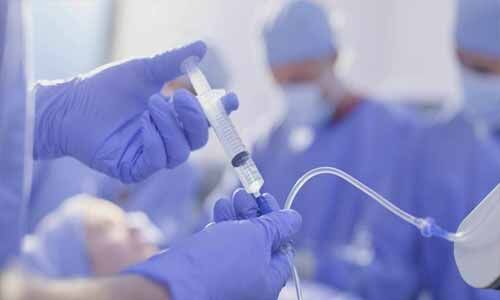- Home
- Medical news & Guidelines
- Anesthesiology
- Cardiology and CTVS
- Critical Care
- Dentistry
- Dermatology
- Diabetes and Endocrinology
- ENT
- Gastroenterology
- Medicine
- Nephrology
- Neurology
- Obstretics-Gynaecology
- Oncology
- Ophthalmology
- Orthopaedics
- Pediatrics-Neonatology
- Psychiatry
- Pulmonology
- Radiology
- Surgery
- Urology
- Laboratory Medicine
- Diet
- Nursing
- Paramedical
- Physiotherapy
- Health news
- Fact Check
- Bone Health Fact Check
- Brain Health Fact Check
- Cancer Related Fact Check
- Child Care Fact Check
- Dental and oral health fact check
- Diabetes and metabolic health fact check
- Diet and Nutrition Fact Check
- Eye and ENT Care Fact Check
- Fitness fact check
- Gut health fact check
- Heart health fact check
- Kidney health fact check
- Medical education fact check
- Men's health fact check
- Respiratory fact check
- Skin and hair care fact check
- Vaccine and Immunization fact check
- Women's health fact check
- AYUSH
- State News
- Andaman and Nicobar Islands
- Andhra Pradesh
- Arunachal Pradesh
- Assam
- Bihar
- Chandigarh
- Chattisgarh
- Dadra and Nagar Haveli
- Daman and Diu
- Delhi
- Goa
- Gujarat
- Haryana
- Himachal Pradesh
- Jammu & Kashmir
- Jharkhand
- Karnataka
- Kerala
- Ladakh
- Lakshadweep
- Madhya Pradesh
- Maharashtra
- Manipur
- Meghalaya
- Mizoram
- Nagaland
- Odisha
- Puducherry
- Punjab
- Rajasthan
- Sikkim
- Tamil Nadu
- Telangana
- Tripura
- Uttar Pradesh
- Uttrakhand
- West Bengal
- Medical Education
- Industry
Life-saving heart surgery scaled down as COVID-19 spread

As the novel coronavirus spread across the globe in early 2020, hospitals worldwide scaled back medical procedures, including life-saving heart surgery, to deal with the emerging threat of COVID-19.
Now, as the Covid 19 virus becomes a chronic fact of life, hospitals must find ways to resume cardiac surgeries while protecting patients and health care workers as much as possible from SARS-CoV-2.
Dr. Marc Ruel, professor in the Departments of Surgery and Cellular and Molecular Medicine at uOttawa Faculty of Medicine, and M. Pitfield Chair & Head, Division of Cardiac Surgery at the University of Ottawa Heart Institute, is the senior author of two recent articles that examine how cardiac surgery centres have been impacted by the COVID-19 pandemic, and how they can resume operations in an environment characterized by a low-grade, long-term prevalence of SARS-CoV-2.
"Cardiac surgeons, who provide lifesaving procedures, must manage two threats at the same time: obviously the threat from COVID, and that of death or complications from untreated heart disease. As such, patients with the most pressing cardiac needs have to be triaged as objectively and as reliably as possible, using predictor tools such as the one developed at the University of Ottawa by my colleague Dr. Louise Sun, from the Department of Anesthesia and Pain Medicine," Dr. Ruel said. "Every day we strive to preserve capacity for a possible COVID surge, but at the same time we must optimally manage our many patients who need heart surgery, help ease their anxieties, and safely return them to enjoying a healthy life."
In the first article, "Response of Cardiac Surgery Units to COVID-19: An Internationally-Based Quantitative Survey," published in Circulation, Dr. Ruel and his co-authors found that 60 cardiac surgery centres in 19 countries had reduced their cardiac surgeries by an average of 50 to 75% in response to the pandemic.
"The widespread interruption in cardiac surgery described herein adds to the concerning observation that excess non-COVID-19 mortality may now surpass mortality directly related to COVID-19 infections," the article noted.
The second article, "Committee Recommendations for Resuming Cardiac Surgery Activity in the SARS-CoV-2 Era: Guidance from an International Cardiac Surgery Consortium" published in The Annals of Thoracic Surgery, contains 12 recommendations developed by a consortium of experts in 19 countries. The recommendations cover topics such as: prioritizing surgeries; dealing with cardiac patients who test positive for COVID-19; and patient discharge and follow-up protocols.
For more details click on the link: http://dx.doi.org/10.1161/CIRCULATIONAHA.120.047865
Hina Zahid Joined Medical Dialogue in 2017 with a passion to work as a Reporter. She coordinates with various national and international journals and association and covers all the stories related to Medical guidelines, Medical Journals, rare medical surgeries as well as all the updates in the medical field. Email: editorial@medicaldialogues.in. Contact no. 011-43720751
Dr Kamal Kant Kohli-MBBS, DTCD- a chest specialist with more than 30 years of practice and a flair for writing clinical articles, Dr Kamal Kant Kohli joined Medical Dialogues as a Chief Editor of Medical News. Besides writing articles, as an editor, he proofreads and verifies all the medical content published on Medical Dialogues including those coming from journals, studies,medical conferences,guidelines etc. Email: drkohli@medicaldialogues.in. Contact no. 011-43720751


